There are several reasons why dogs eat poop. One reason is that they may be trying to get nutrients that they are not getting from their regular diet. Another reason is that they may be trying to mark their territory. And still another reason is that they may simply be curious about the strange smell.
Other times, it could be attention-seeking behavior, boredom, or lack of mental stimulation. Anxiety and stress can also trigger coprophagia, as dogs try to alleviate their worries through this unusual act. Medical conditions and digestive issues should not be ruled out, as they can contribute to this behavior.
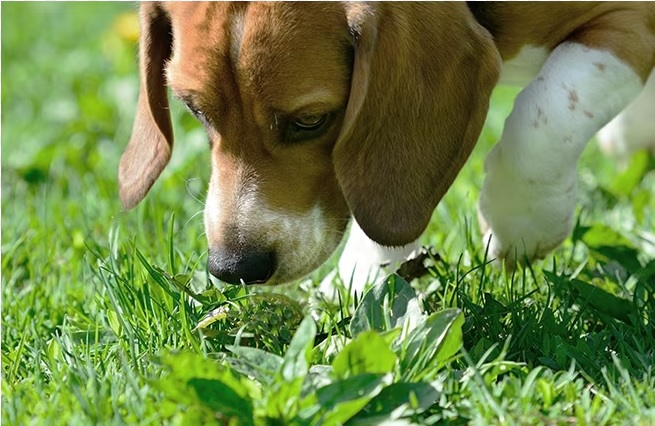
Fear not! In the upcoming article, we will explore the various reasons why dogs eat poop and offer effective strategies for prevention. So get ready to unravel the mystery behind this rather off-putting canine curiosity!
Dogs Eat Poop Key Takeaways
- Dogs eat poop due to instincts and survival behavior.
- Nutritional deficiencies and dietary imbalances can lead to poop-eating.
- Attention-seeking behavior may cause dogs to eat poop.
- Boredom and lack of mental stimulation can contribute to coprophagia.
Natural Instincts and Survival Behavior
Dogs eat poop due to their instincts and survival behavior, which can be puzzling and gross to humans.
It all goes back to their ancestral roots when dogs were wild predators. In the wild, finding food was not always easy, so they had to rely on whatever resources were available. This included scavenging for leftovers or even hunting small prey. Eating poop was a way for them to maximize their chances of survival by obtaining extra nutrients from undigested food particles.
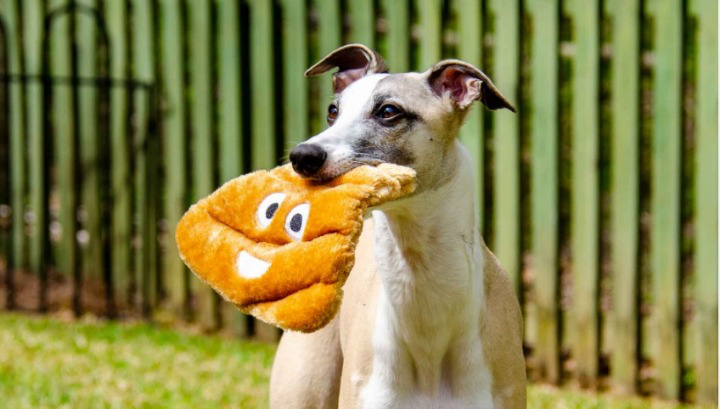
Furthermore, eating the feces of other pack members played a role in maintaining pack hierarchy and social bonds.
While it may seem disgusting to us, it is important to understand that this behavior is deeply ingrained in their nature and serves a purpose in the wild.
Nutritional Deficiencies and Dietary Imbalances
Canines may consume waste due to potential nutrient deficiencies and imbalances in their diet. When dogs eat poop their lack essential nutrients, they instinctively seek alternative sources of nourishment, even if it means eating feces. To prevent coprophagia (the scientific term for poop-eating), addressing any nutritional gaps in your dog’s diet is crucial.
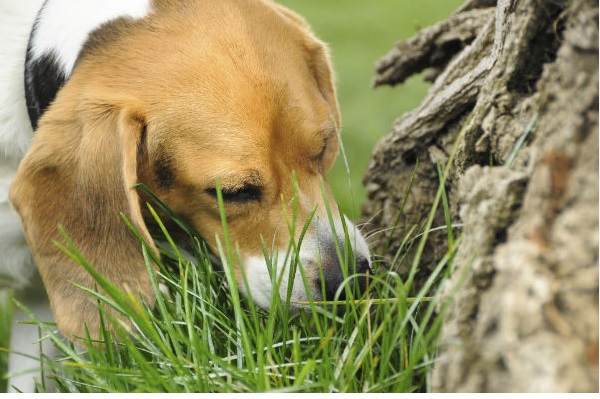
Here are four ways to ensure a balanced and nutritious meal for your furry friend:
Providing a well-balanced diet and addressing any nutritional deficiencies can help prevent your beloved canine from engaging in this unsavory behavior.
Attention-Seeking Behavior
Seeking attention from their owners, dogs may exhibit various behaviors intended to capture their owner’s focus and engage in interactive play. One such behavior is the act of eating poop. While it may seem disgusting to us, dogs might resort to this behavior to seek attention from their owners. They may have learned that doing something so repulsive can get a reaction out of their humans.
This could be a sign that your dog is feeling neglected or bored and is trying to get you involved somehow. To address this attention-seeking behavior, you must provide your dog with plenty of mental and physical stimulation through regular exercise, playtime, and behavioral training. By meeting your dog’s needs for attention and interaction, you can help discourage them from engaging in such undesirable behaviors.
Boredom and Lack of Mental Stimulation
Feeling bored and lacking mental stimulation, you may find your furry friend resorting to unexpected behaviors. Dogs are intelligent creatures that require mental stimulation to keep them engaged and prevent boredom. When dogs do not receive enough mental exercise, they may engage in activities that seem peculiar to us humans, such as eating poop. This behavior can be attributed to a lack of environmental enrichment and the absence of interactive toys.
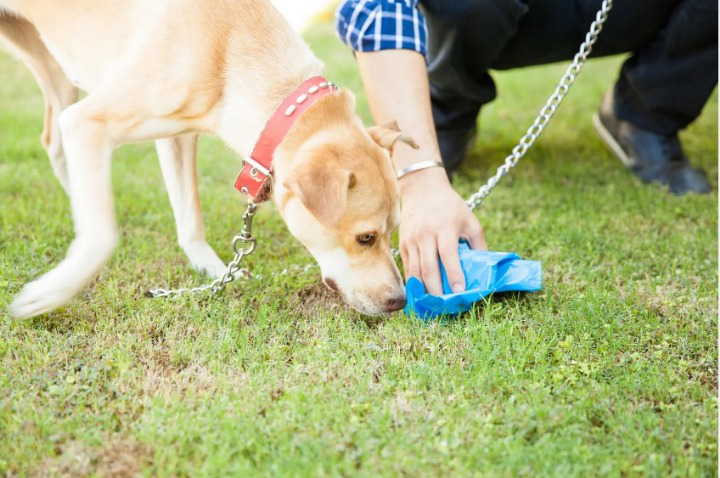
To address this issue, providing your dog with various forms of mental stimulation is important. Environmental enrichment can include creating an engaging living environment by introducing new smells, textures, and sounds. Additionally, interactive toys can be extremely beneficial in keeping your dog mentally stimulated.
These toys challenge their problem-solving skills and provide entertainment while you are away.
Incorporating these strategies into your dog’s routine can help alleviate their boredom and discourage them from engaging in undesirable behaviors like eating poop. Remember, a mentally stimulated dog is a happy and well-behaved companion!
Dogs Eat Poop Because of Anxiety and Stress
Experiencing anxiety and stress, our beloved furry friends may display behaviors that tug at our heartstrings. When dogs feel anxious or stressed, they might eat poop as a coping mechanism. It may seem strange to us, but it provides temporary relief from their overwhelming emotions for them.
If you want to help your dog overcome this behavior and promote their overall well-being, here are four strategies for anxiety management and stress reduction:
By implementing these strategies, you can help manage your dog’s anxiety and reduce stress levels while fostering a loving relationship based on understanding and support.
Medical Conditions and Digestive Issues
If your dogs eat poop habit isn’t related to anxiety or stress, it could be due to medical conditions and digestive issues. Dogs with inflammatory bowel disease or enzyme deficiencies may be more inclined to eat their feces.
Inflammatory bowel disease is a chronic condition that causes inflammation in the gastrointestinal tract, leading to diarrhea and poor nutrient absorption. Dogs with this condition may eat poop to obtain nutrients their body isn’t absorbing properly.
On the other hand, enzyme deficiencies can prevent dogs from fully digesting their food, making their waste smell appealing and nutritious.
It’s important to consult with your veterinarian if you suspect any underlying medical conditions causing your dog’s poop-eating behavior, as they can provide proper diagnosis and treatment options to address these issues effectively.
Learned Behavior and Reinforcement
The consumption of feces may become a habitual behavior for dogs due to learned behavior and the reinforcement they receive from their environment. Dogs are social animals that learn through observation and imitation.
If they see other dogs eating poop, they may be more likely to engage in this behavior. Additionally, if a dog receives attention or treats after eating feces, it can reinforce and encourage the behavior.
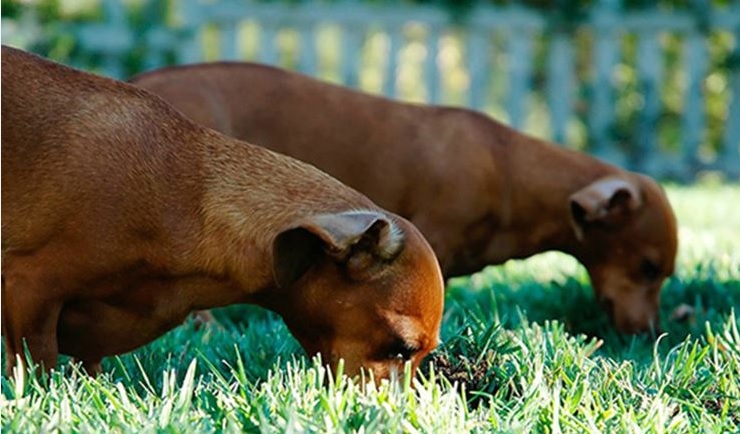
By observing others and imitating their actions, dogs can learn that eating poop is acceptable or even rewarded. This learned behavior is reinforced when they receive attention or treats from their owners after engaging in this activity.
For those who strive to serve others, it’s important to provide proper training and discourage this behavior by redirecting their attention toward more positive activities.
And you must know dogs body language as their owners.
Ways to Prevent and Address Coprophagia
To prevent and address coprophagia, you can utilize various strategies that will help redirect your furry friend’s focus toward more desirable behaviors.
Training techniques play a crucial role in this process. Teaching your dog basic obedience commands like ‘leave it’ or ‘drop it’ can help discourage them from eating poop.
Additionally, you can provide environmental enrichment to keep your dog mentally stimulated and less likely to engage in coprophagia. This can include puzzle toys, interactive games, or regular exercise to burn off excess energy.
Creating a positive reinforcement system where your dog is rewarded for good behavior can also be effective in preventing Dogs poop-eating habits.
Remember, consistency and patience are key when implementing these strategies. You can help your four-legged friend overcome this behavior and lead a healthier life with time and effort.
SEE ALSO:
- Animal Behavior College: The Best Way to Train Your Pet
- Empower Positive Behavior with the Best Dog Training Collar
- Explore the Top Dog Training Books for Effective Pet Education
- Discover the Benefits of Martingale Collars for Gentle and Effective Dog Training
Frequently Asked Questions
How can I train my dog to stop eating poop?
To train your dog to stop eating poop, use positive reinforcement techniques such as rewarding them with treats and praise when they avoid it. Additionally, try natural remedies like adding pineapple or pumpkin to their diet to make their poop less appealing.
Are all dogs prone to eating poop, or is it only certain breeds?
All dogs are prone to eating poop, but it may be more common in certain breeds. Use effective dog training techniques to prevent this behavior and address common reasons for coprophagia, such as boredom or nutritional deficiencies.
Can coprophagia be a sign of a serious underlying medical condition?
Yes, coprophagia can be a sign of serious underlying medical conditions in dogs. Identifying and addressing these causes is important as they can pose potential health risks to your furry friend.
Do certain medications or supplements help to prevent dogs from eating poop?
Are they looking for a way to stop your furry friend from snacking on poop? Well, medications and alternatives exist! These solutions can help prevent dogs from indulging in their not-so-appetizing habit.
Can coprophagia be a sign of a behavioral problem that requires professional intervention?
Yes, coprophagia can indicate a behavioral problem that may require professional intervention. A qualified trainer can help by using effective training techniques to address this issue and promote proper behavior.
CONCLUSION
There are many reasons why dogs eat poop. Some of the most common reasons include nutritional deficiencies, boredom, attention-seeking, anxiety, and medical conditions. If you are concerned that your dog is eating poop, it is important to talk to your veterinarian to rule out any medical causes.
There are also a number of things you can do to prevent your dog from eating poop, such as providing them with a balanced diet, giving them plenty of exercise, and making sure they are not bored or anxious.
Visit our website: https://bonevoyagedogrescue.com/ today to learn more about how you can help.
